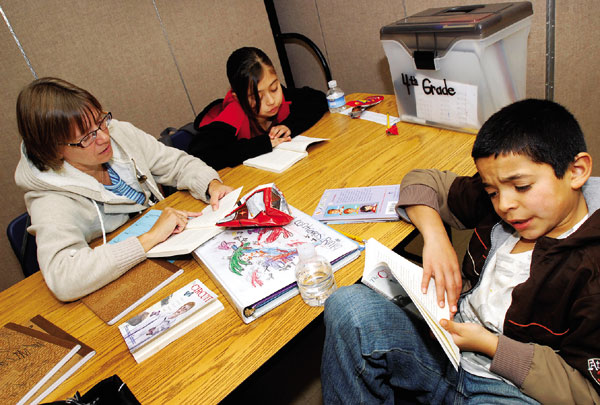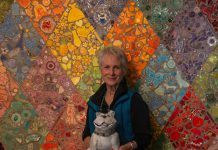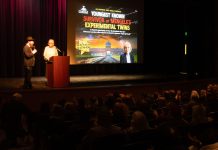Many of Jasmine Square’s 220 residents
– half of whom are children – are fighting the subsidized
housing stigma, taking spirited action to break the cycle of
poverty by empowering themselves and their neighbors.
Many of Jasmine Square’s 220 residents – half of whom are children – are fighting the subsidized housing stigma, taking spirited action to break the cycle of poverty by empowering themselves and their neighbors.
The 72-unit complex at 16530 Monterey St. opened in 2005 and provides affordable housing to families and individuals who have extremely low and very low income levels, property manager Estela Gonzalez said. Rents are on a sliding scale based on income and can be as low as $551 for a one-bedroom apartment or as high as $1,369 for a four-bedroom apartment.
Affordable housing is a hot topic in Morgan Hill, and it’s these income levels that the anti-subsidized housing set resents most. The stigma is that these renters are taking advantage of the system and are a dark mark on the community, bringing down school test scores and driving up crime rates.
But this complex is replete with residents who have goals: from reading at their grade level to owning their own home.
Take 12-year-old Jose Mendoza, for example.
“I was mostly all failing,” Mendoza said of his school performance four years ago. That’s when he started attending an after school tutoring program in Jasmine Square’s community room.
“I was feeling like I wasn’t going to make it through school. Like I was too dumb to learn,” Mendoza said. The program’s director, Dr. Cheryl McElvain, said most of the Jasmine Square children are, like Mendoza, first or second generation Mexican immigrants whose parents don’t have the education or the grasp of the English language to help their students with school work. McElvain’s program, called The Bridge Project, has helped 30 Jasmine Square children improve their grades. Many of the project’s volunteers signed up through the Morgan Hill Volunteer Fair last fall.
On average, the students have raised their reading levels by an entire grade level, said McElvain, who is an education lecturer at Santa Clara University and plans to submit a research paper on The Bridge Project to an educational journal.
Since starting with the program, Mendoza has nearly caught up with his peers in reading and math, he said with a shy, proud smile and a shrug. He said he feels better about himself now, too.
The Bridge Project isn’t the only class available at Jasmine Square. South County Housing Community Development Director Rachael Castro put together a six-week life skills class in 2006, where residents like Gaby Leal learned how to visualize success.
“This one is the model property,” Castro said of Jasmine Square.
Gaby Leal said it was Castro’s life skills classes that helped her reach a small goal – losing 10 pounds – and a bigger one: moving her family of five into a home that she and her husband own.
Thanks in part to the low rent at Jasmine Square, she and her husband have saved enough to purchase a home. They’ve been approved for a loan; now they’re trying to find a house in their price range, she said.
“Until Rachael did this class I never thought seeing it in your mind is believing that it can happen,” she said.
Karla Sewell said the classes taught her and her husband about positive financial steps.
“We have two more things to pay, then we’ll be free of debt. It’s a good feeling to know that it’s almost paid,” she said. “The next step is learning about credit, revamping it, establishing credit.”
Sewell said she and her husband Richard would like to plan a vacation, too.
“The life coaching program at Jasmine really makes a difference,” she said. “It encourages you and empowers you.”
The Sewells both have cerebral palsy and mostly use wheelchairs to get around. Karla Sewell said living at Jasmine Square has been a positive experience from the beginning.
“It’s a very positive, helpful, nurturing environment,” Sewell said. “(Neighbors) come over and check on us, make sure things are going smoothly for us. And we do the same for them.”
Community members started taking charge during the summer of 2006. There was a heat wave that summer, and the residents had trouble voicing their concerns to the management and getting things changed. So management created a resident council so the tenants would have a platform for their opinions.
The council had a lasting impact, and several original residents have been leaders in the small community since, organizing free garage sales (dubbed the “Great Giveaway”), game nights and unofficial neighborhood watch programs.
Leal said leaders organized meetings with the Morgan Hill Police Department and officers told them what to look out for in the area. About a year ago, cars in the parking lot were broken into and the residents were fed up. They asked the police to drive through the complex once a day “so that people could see that we were serious,” Leal said.
“About two months later, after all our efforts, we figured out that there was a small gang living in one of the apartments. They feared us and moved out. Since then it’s been very quiet.”
Since the council was established, the average service call volume of the area has dropped from 14 calls a month to between 4 and 6 calls, said Cpl. Mindy Zen of the Morgan Hill Police Department.
“The residents of Jasmine Square have volunteered their time and organized canned food drives, toys for tots and jackets for families in need,” Zen said. “Their selflessness and compassion toward others is to be commended.”
Leal said she loves being able to help others in her community, “just like I was helped when I was a single teenage mom.
“It’s all about who wants to get involved, care for others, do the legwork and organize the events,” Leal said.








